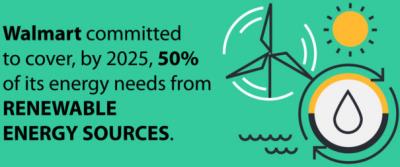|
Walmart as with many multinationals and U.S.-focused companies has developed their "ESG investment theses". It is now held that not only does a company have to provide a satisfactory return on investment but it should do so sustainably with concern for social issues and demonstrate strong ethical values. Based on trends in the E.U., investors recognize that the long-term growth and continuity of dividends will be dependent on adherence to the principles of ESG especially as governments are demanding compliance in environmental and worker issues. McLaughlin notes that "customers, investors, employees, community leaders all expect businesses to be part of the solution - to bring their particular capabilities to bear on the social and environmental issues most relevant to them and their stakeholders".
 Walmart is committed to reduce emissions through a program of investment, supplier engagement and innovation in product supply chains. This approach implies that success achieved by Walmart will be linked to the achievements of suppliers. Accordingly, greater pressure will be placed on broiler and turkey producers to conform to the principles of ESG. Walmart is committed to reduce emissions through a program of investment, supplier engagement and innovation in product supply chains. This approach implies that success achieved by Walmart will be linked to the achievements of suppliers. Accordingly, greater pressure will be placed on broiler and turkey producers to conform to the principles of ESG.
Walmart intends to apply a science-based approach to environmental stewardship and will set an example that will of necessity be followed by suppliers. Conservation of energy, improved efficiency throughout the chain of production from brooding, grow-out, processing and delivery will all be scrutinized. The use of renewable power will be first encouraged and then mandated requiring the use of wind generators and solar panels. There will be significant changes in packaging, emphasizing conservation and recycling capability. Greater cooperation between supplier and customer will be evident with increasing consultation and participation in joint projects to conserve resources. Companies applying ESG will have to develop quantitative goals and measure progress. A review of corporate reports issued by EU-based companies demonstrates the extent to which ESG data is presented along with traditional financial performance.
The social component of ESG presumes development of human capital. Producers will have to demonstrate equity in recruitment, employment, promotion, education and health services. Walmart has established programs to create opportunities for employees and will expect similar initiatives from their suppliers. Philanthropy will also be regarded as a positive expression of social responsibility and will become more structured, assuming a greater role in interaction with communities where companies operate.
Walmart established the Center for Racial Equity in 2020 with a commitment of $100 million through 2025. Large customers practicing ESG will expect comparable efforts by their suppliers and will provide guidance on relevant activities contributing to social equity.
Based on the inevitability of compliance with customer ESG requirements, the following areas should be considered by suppliers who will compete over the next decade:-
- Improved management of land holdings to promote sustainability
- Reduction in energy demands and converting from power generated by fossil fuels
- Enhanced feed efficiency through precision nutrition, more advanced equipment and management
- Conservation of water and greater attention to processing and recycling of animal waste and plant effluent
- Programs to advance the knowledge and capabilities of employees
- Evaluation of wage rates, fringe benefits, health, worker accommodation and social support systems
- Rationalization of product delivery to reduce energy consumption
- Concentration on recycling of water, packaging and other resources
ESG is not a fad or a concept that can be faked. ESG will determine the relationship between suppliers and customers and will represent a new competitive component in the chain extending from producer to consumer. Companies that fail to recognize the importance of ESG will be at a disadvantage with respect to their more progressive peers. Producers are advised to become acquainted with the Sustainability Accounting Standards Board, the Task Force on Climate-Related Financial Disclosures and the intended requirements of their major customers in order to plan compliance. Failure to recognize the importance of ESG and to implement programs will represent a major strategic deficiency, threatening the growth of an enterprise, brand image and long-term survival.
|